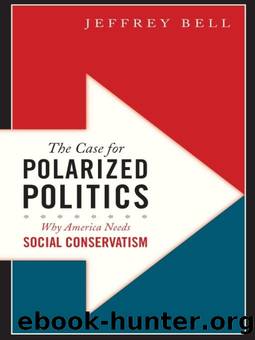The Case for Polarized Politics: Why America Needs Social Conservatism by Jeffrey Bell

Author:Jeffrey Bell [Bell, Jeffrey]
Language: eng
Format: epub
Tags: Politics, Political Science, General, Political Ideologies
ISBN: 9781594035791
Google: xDyy4BDDirsC
Goodreads: 16388947
Publisher: Encounter Books
Published: 2012-01-03T06:56:56+00:00
8
COUNTERATTACK ON EQUALITY
After the British Army and native Loyalists had been overcome in the Revolutionary War, the idea of political equality was virtually unchallenged in American politics. The 13 colonies (soon to be states) had no native monarchy and no blood-defined aristocracy after the handful of titled British noblemen withdrew along with the Union Jack. Primogeniture (inheritance of land exclusively by the eldest son) existed but was repealed in the states with little resistance. Unlike nearly all of Europe, the central government had no established church and (with passage of the First Amendment) no realistic possibility of getting one. Yet there was no serious effort to marginalize religion in general or prohibit a single denomination in the national or state capitals.
This is not to say that American politics was tame in the early years of independence. The chaos of competing, economically predatory state governments under the Articles of Confederation generated an existential crisis, perhaps the only sort of crisis sufficient to compel adoption of the U.S. Constitution.
In Philadelphia beginning in 1787, two pillars distinctive of the American version of the conservative enlightenment were debated: decentralization (to be modified, relative to the Articles) and separation of branches (to be enhanced). To come to agreement on a workable constitution, states gave ground to centralizers on issues relating to the powers of the federal government; and populist advocates of legislative supremacy, which under the Articles had characterized politics at both the national and state levels, had to allow for an independently chosen (and therefore more robust) executive branch.
To most republican theorists of the 18th century, a time of no vigorous ongoing examples of popular rule in anything larger than a city-state, a more robust executive meant a return, or the danger of a return, to some version of ruling monarchy. (That is essentially what had happened when, in the aftermath of its regicide, the British Parliament in 1649 elected Cromwell as Lord Protector.) Advocates of innate equality could not and did not anticipate the rise of an elected presidency that, in instances from Andrew Jackson to Ronald Reagan, led populist or egalitarian reform against a more elitist and more cautious Congress. Many of those who accepted the institution of an independently chosen president did so out of the need to end the chronic disorder under the Articles of Confederation. Also key was the fact that George Washington, the principled, widely trusted military hero of the republican revolution, made himself available to serve. Even these weighty factors were not enough to induce egalitarian populists such as Patrick Henry to endorse the Constitution
The fact remains that when the first constitutional Congress was called to order in 1789, the United States had achieved a far more rooted and egalitarian version of the conservative enlightenment than Great Britain had in its Glorious Revolution exactly one century earlier. There was no king or nobility. There was no established national church and no religious test for voting or holding office. The branch of the federal government designed to wield the power of the purse, the House of Representatives, was chosen by direct popular vote.
Download
This site does not store any files on its server. We only index and link to content provided by other sites. Please contact the content providers to delete copyright contents if any and email us, we'll remove relevant links or contents immediately.
The Secret History by Donna Tartt(19046)
The Social Justice Warrior Handbook by Lisa De Pasquale(12185)
Thirteen Reasons Why by Jay Asher(8889)
This Is How You Lose Her by Junot Diaz(6875)
Weapons of Math Destruction by Cathy O'Neil(6264)
Zero to One by Peter Thiel(5786)
Beartown by Fredrik Backman(5737)
The Myth of the Strong Leader by Archie Brown(5496)
The Fire Next Time by James Baldwin(5429)
How Democracies Die by Steven Levitsky & Daniel Ziblatt(5213)
Promise Me, Dad by Joe Biden(5141)
Stone's Rules by Roger Stone(5080)
A Higher Loyalty: Truth, Lies, and Leadership by James Comey(4950)
100 Deadly Skills by Clint Emerson(4919)
Rise and Kill First by Ronen Bergman(4778)
Secrecy World by Jake Bernstein(4740)
The David Icke Guide to the Global Conspiracy (and how to end it) by David Icke(4699)
The Farm by Tom Rob Smith(4502)
The Doomsday Machine by Daniel Ellsberg(4484)
